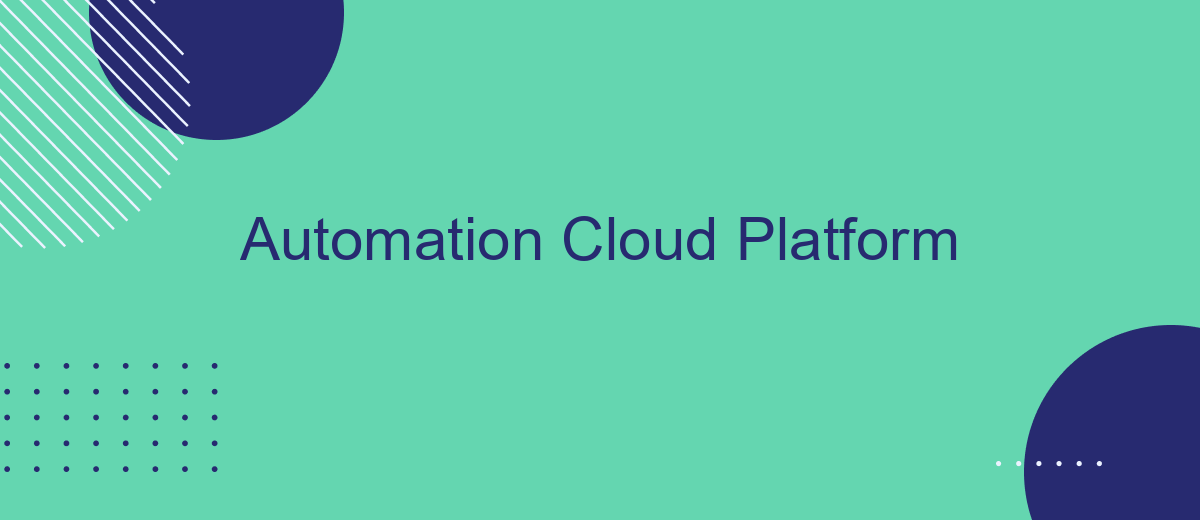The Automation Cloud Platform is revolutionizing the way businesses operate by streamlining processes and enhancing productivity. This innovative solution integrates advanced technologies such as artificial intelligence and machine learning to automate repetitive tasks, reduce human error, and optimize resource allocation. By leveraging cloud-based infrastructure, companies can scale operations effortlessly and access real-time data insights, enabling them to stay competitive in an ever-evolving digital landscape.
Introduction
As businesses strive to enhance efficiency and reduce operational costs, the adoption of cloud-based automation platforms has become increasingly prevalent. Automation Cloud Platforms provide a robust framework for automating complex workflows, streamlining processes, and facilitating seamless integration across various applications and services. These platforms empower organizations to achieve greater agility, scalability, and innovation by leveraging the power of the cloud.
- Improved operational efficiency through automated processes
- Scalability to accommodate growing business needs
- Enhanced collaboration and integration across departments
- Cost reduction by minimizing manual intervention
- Increased agility and innovation potential
By deploying an Automation Cloud Platform, companies can transform their operations, allowing them to focus on strategic initiatives rather than mundane tasks. This shift not only enhances productivity but also provides a competitive edge in today's fast-paced digital landscape. As organizations continue to evolve, the flexibility and capabilities offered by these platforms will play a crucial role in driving sustainable growth and success.
Benefits

Automation Cloud Platforms offer numerous benefits that significantly enhance operational efficiency and streamline processes across various industries. One of the primary advantages is the ability to automate repetitive tasks, freeing up valuable time for employees to focus on more strategic initiatives. This leads to increased productivity and cost savings, as businesses can allocate resources more effectively. Additionally, these platforms provide scalable solutions, allowing companies to adjust their operations seamlessly as they grow, ensuring that they can meet changing demands without disruption.
Another key benefit is the integration capabilities that Automation Cloud Platforms offer. With services like SaveMyLeads, businesses can effortlessly connect different applications and services, enabling smooth data flow and communication between systems. This integration reduces the risk of errors and ensures that information is up-to-date and accessible. Furthermore, the centralized nature of these platforms enhances collaboration among teams, as data and processes are easily shared and monitored. Overall, Automation Cloud Platforms empower businesses to optimize their operations, improve accuracy, and foster innovation through enhanced connectivity and automation.
Architecture

The architecture of an Automation Cloud Platform is designed to seamlessly integrate diverse systems and processes, enabling efficient automation across various domains. At its core, the platform leverages a microservices architecture, allowing for scalability, flexibility, and ease of maintenance. This modular approach ensures that different components can be independently developed, deployed, and updated without affecting the entire system.
- Service Layer: This layer hosts the microservices responsible for executing automation tasks and managing workflows.
- Integration Layer: Facilitates communication between the platform and external systems through APIs and connectors.
- Data Layer: Stores and manages data required for automation processes, ensuring secure and efficient data handling.
- User Interface Layer: Provides intuitive dashboards and tools for users to design, monitor, and control automation workflows.
- Security Layer: Implements robust security protocols to protect data integrity and ensure compliance with industry standards.
By employing these architectural components, the Automation Cloud Platform offers a comprehensive solution for automating complex processes. It supports rapid deployment and scalability while maintaining high levels of performance and reliability, making it an ideal choice for businesses looking to enhance operational efficiency through automation.
Use Cases

Automation Cloud Platforms are revolutionizing the way businesses operate by streamlining processes and enhancing productivity. These platforms offer a centralized hub for managing automated workflows, making it easier for organizations to optimize their operations. By leveraging cloud-based automation, companies can reduce manual intervention, minimize errors, and accelerate task completion.
One of the primary applications of Automation Cloud Platforms is in the realm of business process automation. This involves automating repetitive tasks such as data entry, report generation, and email responses. Additionally, these platforms are instrumental in IT process automation, where they help in managing server configurations, software deployments, and system monitoring.
- Customer service automation: Automating responses to common inquiries and managing support tickets.
- Marketing automation: Streamlining campaign management, lead scoring, and customer segmentation.
- Supply chain automation: Enhancing inventory management, order processing, and logistics coordination.
Furthermore, Automation Cloud Platforms play a crucial role in digital transformation initiatives. By enabling seamless integration with existing systems and applications, they provide businesses with the flexibility needed to adapt to changing market demands. This adaptability ensures that companies remain competitive and can quickly respond to new opportunities and challenges.
- Automate the work with leads from the Facebook advertising account
- Empower with integrations and instant transfer of leads
- Don't spend money on developers or integrators
- Save time by automating routine tasks
Considerations
When considering an Automation Cloud Platform, it's crucial to evaluate its compatibility with existing systems and processes. Integration capabilities play a significant role in ensuring seamless operations. Services like SaveMyLeads can simplify this process by providing easy-to-use tools for connecting various applications, enhancing workflow efficiency, and reducing manual data entry. Additionally, assessing the scalability of the platform is essential to accommodate future growth and evolving business needs. Make sure the platform can handle increased data volumes and user demands without compromising performance.
Security is another vital consideration. Ensure the platform complies with industry standards and offers robust data protection features, such as encryption and access controls. It's also important to evaluate the platform's support and maintenance services. Reliable customer support can prevent downtime and resolve issues swiftly, minimizing disruptions to business operations. Lastly, consider the cost structure of the platform, including subscription fees and any additional expenses for integrations or premium features, to ensure it aligns with your budget and delivers a strong return on investment.
FAQ
What is an Automation Cloud Platform?
How can an Automation Cloud Platform benefit my business?
How do I set up integrations on an Automation Cloud Platform?
What types of applications can be integrated using an Automation Cloud Platform?
Is it necessary to have technical skills to use an Automation Cloud Platform?
If you use Facebook Lead Ads, then you should know what it means to regularly download CSV files and transfer data to various support services. How many times a day do you check for new leads in your ad account? How often do you transfer data to a CRM system, task manager, email service or Google Sheets? Try using the SaveMyLeads online connector. This is a no-code tool with which anyone can set up integrations for Facebook. Spend just a few minutes and you will receive real-time notifications in the messenger about new leads. Another 5-10 minutes of work in SML, and the data from the FB advertising account will be automatically transferred to the CRM system or Email service. The SaveMyLeads system will do the routine work for you, and you will surely like it.

